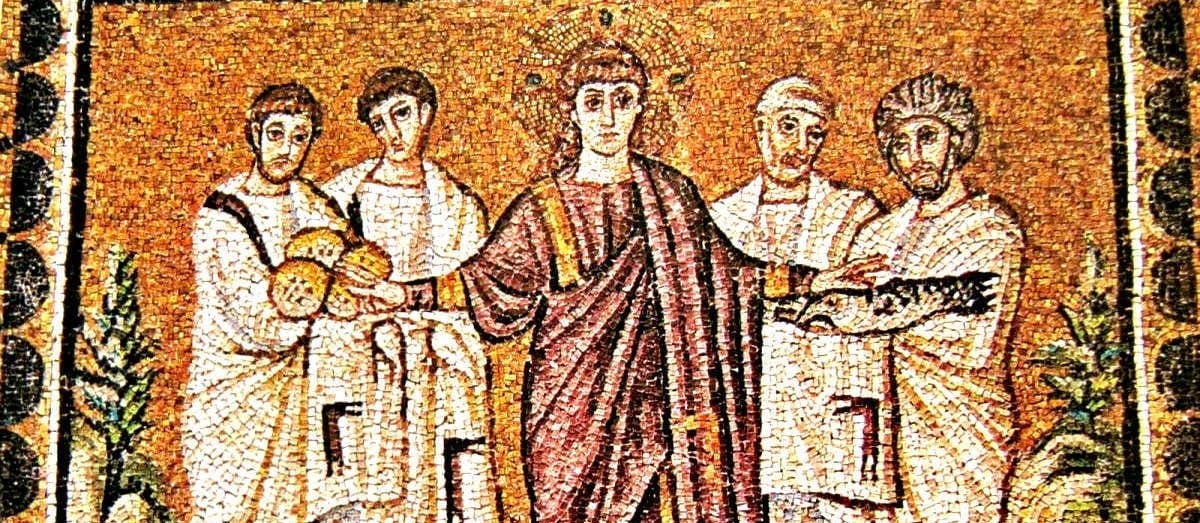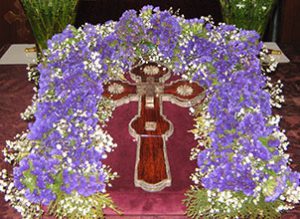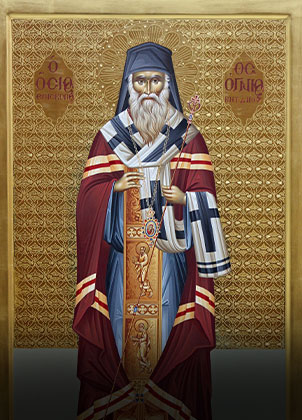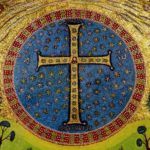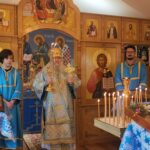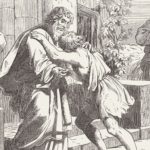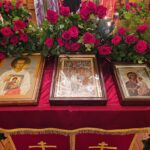Sermon on the 8th Sunday after Pentecost
In the name of the Father and of the Son and of the Holy Spirit.
After having heard about the beheading of St John the Baptist our Lord Jesus Christ departed by boat to a deserted place with His disciples. But the multitudes followed Him along the shore on foot. And when He went out of the boat, He saw a great crowd waiting for Him. The Lord was moved with compassion for them, and healed their sick. Then He was teaching them with His word. When it was evening, His disciples came to Him, saying:
“This is a deserted place, and the hour is already late. Send the multitudes away, so that they may go into the neighborhood villages and buy food for themselves.” But Jesus said to them, “They do not need to go away. Give you them to eat.”
Then He took five loaves and two fishes presented by the apostles. Looking up to heaven, He blessed and broke and gave the loaves to the disciples; and the disciples gave them to the people. After all were filled, they took up twelve baskets full of the fragments that remained. (Math. 14)
This miracle has been called the “multiplication of bread”, because in the hands of the apostles the loaves were multiplying. It prefigured the mystery of the Eucharist. The Lord Himself explained this in His talk on the next day after this miracle, as it is conveyed by St John the Evangelist:
“I am the living bread which came down from heaven. If any man eats of this bread, he shall live for ever: and the bread that I will give is My flesh, which I shall give for the life of the world…Verily, verily I say unto you: unless you eat the flesh of the Son of Man and drink His blood, you shall not have life in you. He that eateth My flesh and drinketh My blood hath everlasting life: and I will raise him up in the last day. He that eateth My flesh and drinketh My blood abideth in me: and I in him. As the living Father hath sent Me and I live by the Father: so he that eateth Me, the same also shall live by Me” (John 6).
Also, the account of the Gospel of the miracle with the loaves corresponds closely to the mystery of the Eucharist:
The Lord took five ordinary loaves of bread, and divinely multiplies them. Likewise, at liturgy the priest uses five prosphoras as the matter of the sacrament.
Further, the Gospel says, that the Lord took the loaves, then looking to heaven, he blessed them, broke and gave them to the disciples so that they distribute them to the people. The Divine Eucharist is celebrated in the same order: first, the prayers of thanksgiving; then the Eucharist bread, named Lamb, is blessed, broken, divided into little particles according to the number of people, and distributed.
As happened there, all those who ate were filled; likewise, the Eucharist bread is always sufficient for all in every church and in all churches in the universe. Because in every particle, despite how little, Christ Himself is present, wholly indivisible, the One able to fill the aspirations of our heart, which except for Him cannot be filled with anything else.
Having blessed the loaves, the Lord gave them to the apostles for distribution. At the Divine Liturgy, though priests stand before the altar and pray, it is the Lord Jesus Christ, the High Priest forever, Who performs the mystery and turns bread into His body, and wine into His blood. And then priests give Communion to the people.
“Give you them to eat”, – these words of the Lord to the apostles remain living and active in the Church for all ages till the end of the world. They convey the most important task entrusted to bishops and priests: to distribute the Heavenly Bread to the people.
Among the parables of the Gospel there is one, and perhaps the only, addressed exclusively to the apostles, and in their person to their successors, the clergy of the Church.
“Who then is the faithful and sensible servant whom his Master put in charge of his household to give the other servants their food at the proper time?” (Math. 24), – This is how this parable begins. So, bishops and priests are, in the first place, distributors of the Divine food to their co-servants at the proper time.
But what is the proper time to receive Holy Communion?
It wouldn’t be mistaken to say, that every time when the Divine Liturgy is celebrated, is the proper time to partake of the mysteries with due preparation.
Our present circumstances made it difficult for many to be partakers of the Holy Communion. But nothing happens without God’s providence. The Lord is testing our faith. Maybe He is teaching us to value His great gift more, so that we become eager to often receive Christ in Holy Communion.
Amen.

